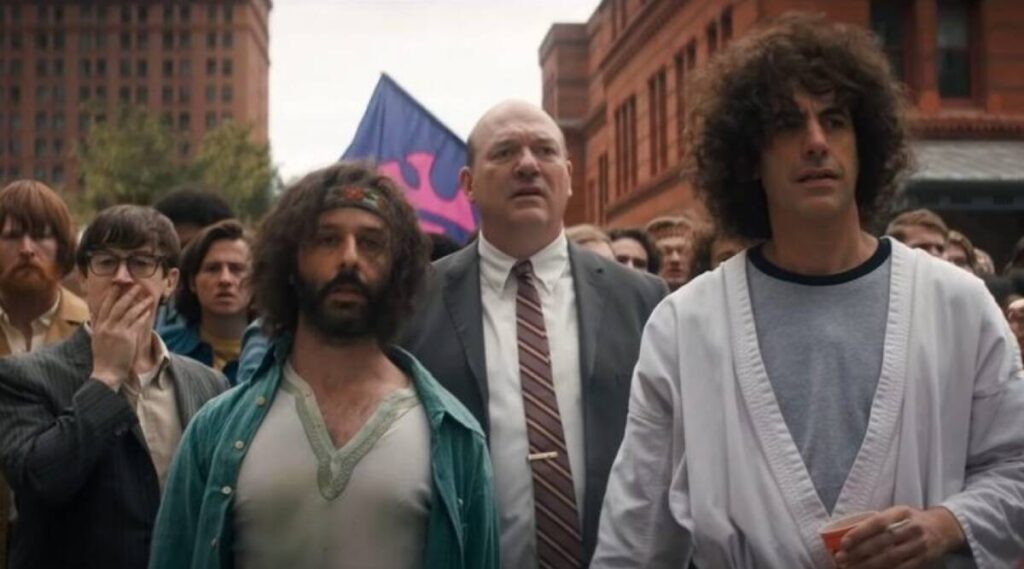
The day before Aaron Sorkin’s newest movie premiered on Netflix, his second-oldest TV show rose from the dead: HBO released its West Wing special, reuniting the entire cast for a stage production of “Hartsfield’s Landing”, one of the series’ classic odes to democracy in action. Watching “Hartsfield’s Landing” less than a month before the 2020 election, it felt less like a slice of healthy idealism than an artifact of outright fantasy, a trip to an imaginary world where the civil servants in the White House behaved nobly and responsibly. The Trial of the Chicago 7 is of a piece with The West Wing, seeing as it’s about Great Men fighting valiantly in the face of corruption or indifference. But the orientation has changed. Whereas The West Wing was an ardent, nigh fanatical expression of faith in American government, Chicago 7 represents a more dubious view of the nation’s political machinery. Now, Sorkin’s heroes are fighting the power, not wielding it.
I’m not sure how much to read into this. For one thing, despite his obvious liberal credentials, Sorkin is hardly the most political of artists; he’s more interested in ideals than issues. For another, he wrote his first draft of the Chicago 7 script way back in 2007, so I’m wary of inferring any parallels to the current administration. Still, when an early scene finds the newly installed attorney general, John Mitchell (John Doman), ordering a career prosecutor, Richard Schultz (Joseph Gordon-Levitt), to weaponize the Justice Department in 1969 and indict the President’s political enemies, it’s easy enough to imagine a young Bill Barr sitting in the corner, taking notes.
As The Trial of the Chicago 7 unfolds, you might find yourself wishing that such equivalencies were more pronounced, and that the film operated as a more incisive and inflammatory call to arms (or to the voting booth). Conversely, you may find Sorkin’s lofty screed against Nixonian might to be ahistorical or lacking in context. I’m not inclined to tell you what to think; after all, one of the tenets of the American founding is the freedom of belief. But from my perspective, fretting about the particulars of Chicago 7’s ideological agenda ignores just how good a movie it is. Marshaling his considerable artistic gifts—snappy dialogue, propulsive pacing, the ability to attract an indecently talented cast and maximize its allure—Sorkin has delivered a superior entertainment, a breezily kinetic production that crackles with intelligence and charm.
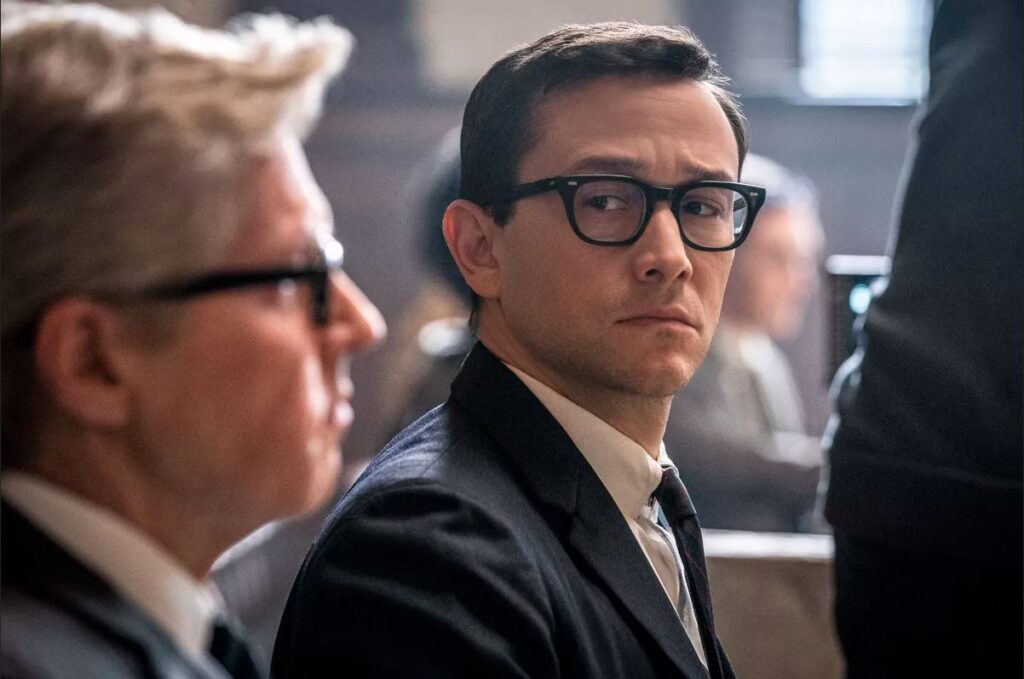
As all films of its type are lawfully required to do, Chicago 7 opens with a blizzard of archival footage—black-and-white clips of Lyndon Johnson, Walter Cronkite, draft lotteries, etc.—efficiently setting the period scene. (The prologue recalls Da 5 Bloods, which is similar to Chicago 7 in the way it evokes Vietnam-era unrest and wildly different in terms of everything else.) We meet the titular septet—which is actually an octet, as Black Panther co-founder Bobby Seale (Watchmen’s Yahya Abdul-Mateen) is deemed separate from the main group, taxonomically if not legally—in a quick montage designed to illustrate their contrasting personalities as they exhort their followers to travel to Chicago and protest the war at the 1968 Democratic National Convention. When characters first appear, they’re identified with on-screen text, an approach that’s blunt, edifying, and effective.
Which is a fair description of Sorkin’s technique as a whole. He isn’t a subtle writer, but he’s a fiercely smart one, and he conveys information with a tricky combination of whimsy and clarity. As with all of his works, Chicago 7 is laden with words, and they’re exchanged with such erudite vigor that it’s easy to miss how much grunt work they’re doing, the way they advance the plot and sharpen the characters without showing any strain. Some writers make exposition feel especially burdensome; Sorkin does the heavy lifting with a light touch.
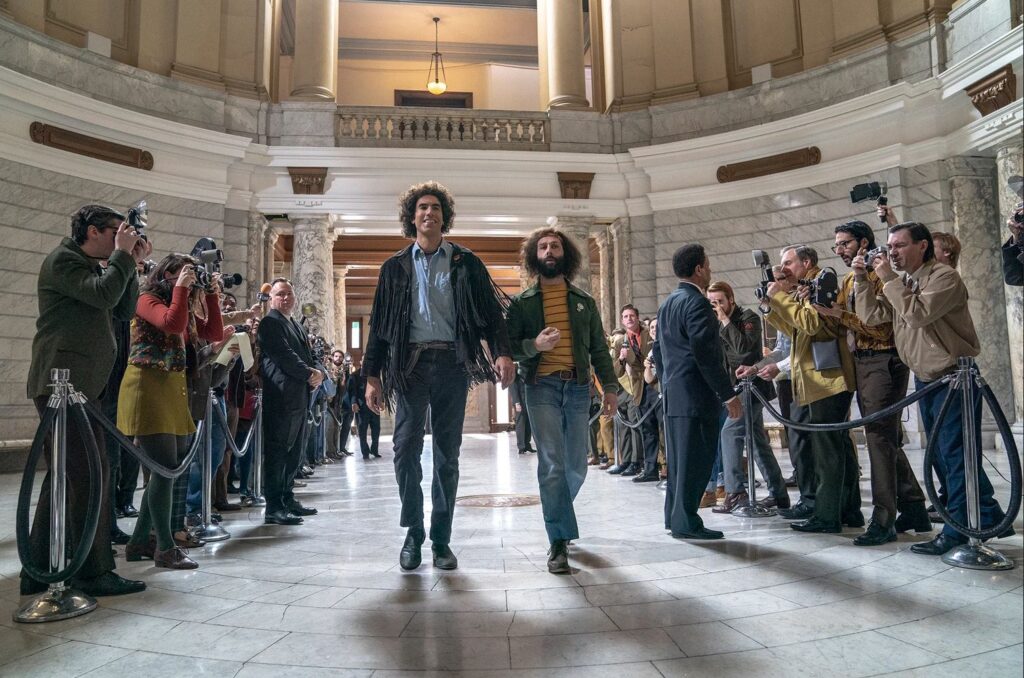
He also, as any A Few Good Men fan could tell you, knows his way around a courtroom. The legal procedural is perhaps the apotheotic venue for Sorkin’s style, given that it inherently transforms petty verbal squabbles into high-stakes combat. Chicago 7—which, I should probably say, recreates the 1969 trial of eight protestors for inciting a riot at the aforementioned convention—is almost musical in its dialogue, a symphony of objections, arguments, and dressing-downs. Very little of it seems realistic, and I care not a whit; after all, adherence to veracity might have deprived us of the scene where the cantankerous and doddering Judge Hoffman (Frank Langella) informs the jury that he isn’t related to the defendant Abbie Hoffman (Sacha Baron Cohen), prompting the latter to exclaim, “Father, no!” Shortly thereafter, Abbie helpfully provides the judge with an explanation that distinguishes between the bank robber John Dillinger, his co-defendant David Dellinger (John Carroll Lynch), and the firearm known as the derringer. It’s poetry in commotion.
That judge, by the way, sits at the rough midpoint on the spectrum of amorality occupied by the movie’s various state dignitaries. At one end is Barr Mitchell, a snarling avatar of venality who is only too happy to brandish the power of his office to pursue a petty, politically motivated vendetta. At the other is Schultz, who begrudgingly accepts his assignment but continually wrestles with his conscience; transplant the action to today, and you can envision him writing one of those anonymous anti-Trump missives, confessing that, though he supports his administration’s policy goals, he laments its brutal methods. Judge Hoffman is neither nakedly corrupt nor socially mindful; rather, he’s a creature of clueless privilege, and Langella plays him with a deft mix of arrogance and befuddlement, as though he’s honestly astounded that anyone would question the validity of his decisions, or would suggest that they’re rooted in obscene prejudice.
That Sorkin and Langella lend this level of dimension to one of the picture’s villains is impressive, given how much else is going on. In his opening statement to the jury, Schultz attempts to dispel the myth that the various defendants belong to distinct organizations, arguing instead that they’re members of a unified conspiracy. For his part, Sorkin’s challenge is to build a cinematic coalition of sorts, integrating his various historical characters into a central narrative with an overriding theme.
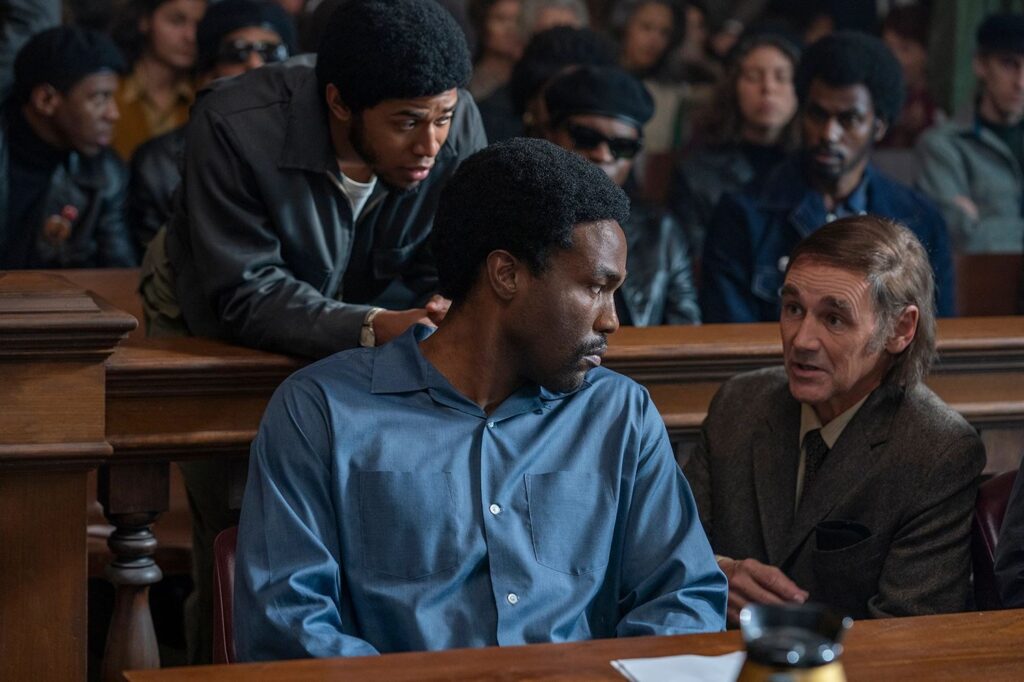
This process plays out most overtly in the case of Seale, who adamantly refuses the services of the attorney representing his fellow defendants, William Kunstler (a wonderful Mark Rylance), and instead demands that he receive his own lawyer. Chicago 7 is perhaps guilty of marginalizing the history of the Panthers, and of failing to grapple fully with the rank racism of the era. (It does sneak in some clever moments nodding at the Panthers’ iconic wardrobe, as when Seale’s lieutenant, Fred Hampton (Kelvin Harrison Jr.), instructs his supporters to disperse throughout the courtroom and to “take off your scary hats.”) But Abdul-Mateen is a lively and charismatic presence, and the tension between Seale and his white colleagues is disturbingly productive; it culminates in a scene that finds him handcuffed and gagged in court, a chilling image which emphasizes that for Black men, the justice system is rarely just.
Speaking of images, Sorkin’s visual craftsmanship remains competent, which may sound like faint praise. Words will always be the engine that powers his creations—only the climax of an Aaron Sorkin movie could revolve around implied possessive pronouns—but as he demonstrated in Molly’s Game, he doesn’t want to be a pure point-and-shoot director. His camerawork here is nothing special, but his ear for rhythm extends to his editing style, which is active but never aggressive. (The editor is again Alan Baumgarten, who’s also collaborated with another hyperactive writer-director in David O. Russell.) It’s most noteworthy in a pair of set pieces that vigorously cut back and forth between the fateful riots themselves and the characters’ descriptions of them, whether via Abbie doing a stand-up routine or Kunstler subjecting a client to a grueling mock cross-examination. It’s robust but not overwhelming, infusing the film with energy without sacrificing lucidity.
That delicate sense of give and take, of push and pull, is mirrored in the movie’s main philosophical clash, which isn’t a fight between the defense and the prosecution but between Abbie and a fellow accused, Tom Hayden (Eddie Redmayne). Abbie, with his wild hair and sarcastic streak, is a true firebrand, sick of playing by the rules; Hayden, by contrast, is a stubborn pragmatist, insisting that Abbie’s radical theatrics will rob activists of the chance to create real change. (Told that Abbie is smarter than Hayden thinks he is, Hayden retorts, “Cows are smarter than I think he is.”) The emotional fulcrum of Chicago 7 involves these two opposite-tempered agitators circling and sniping at one another, gradually recognizing their shared interests and developing a grudging respect.
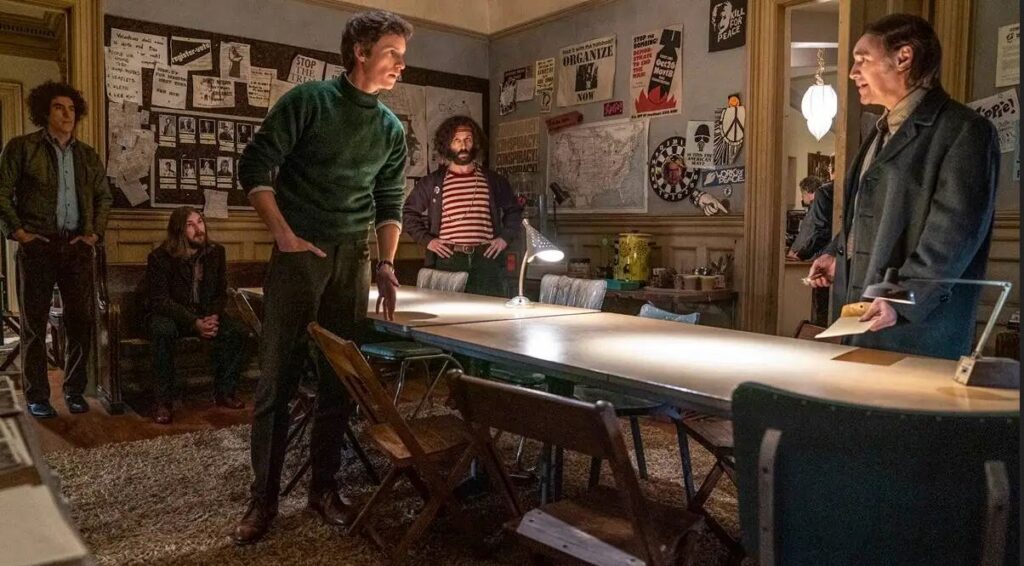
In a way, this is slightly dissatisfying, as it obviates Sorkin of the need to express a genuine point of view; declaring that life is sweeter when we all get along isn’t much of a thesis statement. But The Trial of the Chicago 7 is just too damn enjoyable for me to worry about its political squishiness, and much of that joy derives from simply watching its cast work. There is a distinctly cinephilic pleasure in seeing how a movie patiently rolls out one heavy-hitting character actor after another; I thought I’d hit my limit of “Hey it’s that guy!” dopamine rushes—I’ll admit that it took me roughly half an hour before I realized that counterculture icon Jerry Rubin was being played by the typically straitlaced Jeremy Strong—and that was before an Oscar nominee showed up in the third act. Everyone is good, of course, but I’ll highlight Rylance’s cagey integrity and Baron Cohen’s effortless magnetism. And while Redmayne occasionally struggles with his American accent, his casting is a masterstroke; he’s a naturally inoffensive presence, which means he imbues Hayden with a stoic decency that in turn heightens Baron Cohen’s own electricity.
In one of Chicago 7’s many impossibly engaging courtroom scenes, Kunstler calmly eviscerates a witness, duping him into acknowledging that when Abbie asked for a bribe to call off the protests, he was obviously being sarcastic. It’s a splendid sequence, fast and light and fun but also pulsing with urgency and intensity. In that, it symbolizes the film as a whole. Sure, Abbie was kidding. But this movie is no joke.
Grade: A-
Jeremy Beck is the editor-in-chief of MovieManifesto. He watches more movies and television than he probably should.
